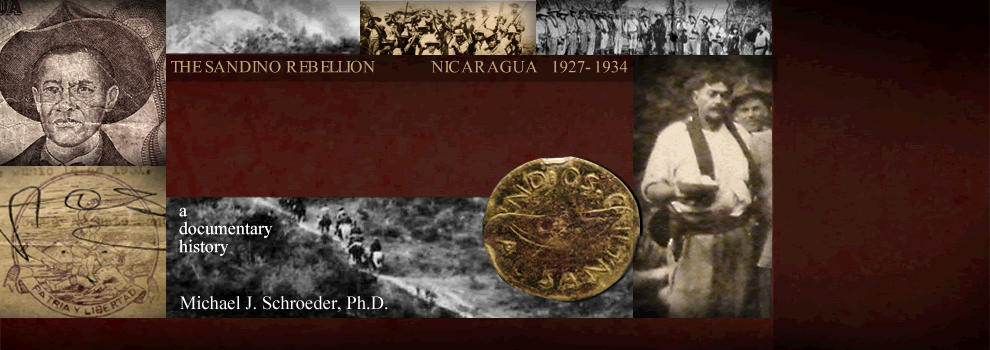|
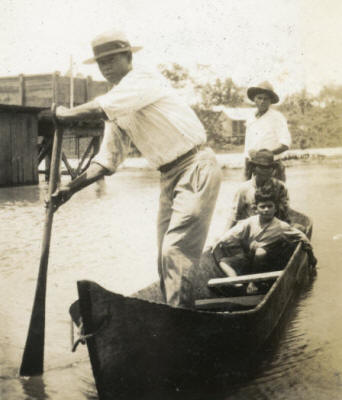 THIS IS THE FIRST PAGE
of documents for the FIRST HALF of 1931
on Nicaragua's Caribbean Coast region, housing
materials dated in the 46 days from January 1 to
February 15.
THIS IS THE FIRST PAGE
of documents for the FIRST HALF of 1931
on Nicaragua's Caribbean Coast region, housing
materials dated in the 46 days from January 1 to
February 15.
The year 1931 dawns with
Sandino gearing up for an
anticipated offensive into the heart
of the Caribbean Coast region, though
of course the Marines & Guardia know
nothing of his plans. The
first hints come in a series of
telegrams in late January reporting
on Sandinista depredations at
Sacklin and elsewhere along the
middle stretches of the Río Coco,
though these initial reports are
largely dismissed as the work of a
small band of “outlaws” on a
“foraging expedition.” In
early February, copies of a Sandino
manifesto surface in the small
village of Kum on the Coco —
in Spanish, addressed to “Los
Obreros y Campesinos Nicaragüenses,”
and more than two months old.
The pro-Sandino sympathies of local
“big man” Adolfo Cockburn of Sacklin
receive particular attention (7 & 9
Feb) — attention that will intensify
in coming months and lead to
Cockburn’s death at the hands of the
Guardia before the year’s end.
Of greater interest to the Marines &
Guardia are the deteriorating
economic conditions along the Coast,
especially inland from Bluefields in
the banana-growing zones around
Rama, where an intense struggle is
unfolding between independent banana
growers (organized into a Planters
Association) and the large
fruit-buying firms (2 & 6 Feb).
The case of Conservative attorney
Pedro Pablo Pérez Gallo in Puerto
Cabezas (13, 17 & 23 Jan) and the
missives of the Moravian Church (1
Jan, 5 Feb) also merit close
attention.
|
|
PERIOD MAPS
|
|
1894 mosquito
shore

27 MB,
library of congress
|
1920s
Standard Fruit

6.5 mb,
US National archives
|
1928 Rio wanks
Patrol

3 mb, us
national archives
|
1931 Moravian

2.4 mb,
comenius press
|
|
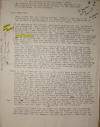
|
1.
1 January 1931.
Letter from Guido
Grossman to the Members of the
Provincial Board, Moravian Church, p. 1.
[date uncertain,
ca. 1 Jan. 1931]
"To the Members of the Provincial Board.
My opinion on the various points of the
suggestions of: Bro. Haglund, Stortz and
Heath in regard to the financial re
arrangements of the Province. ¶ Dear
Brethren:- many thanks for the various
minutes which you sent me, it was
interesting reading, some of the ideas
were old friends, which we had spoken of
and dismissed again in the G.M.C. 1920.
¶ I do not share the opinion expressed
namely: that the Indians do not
understand the financial arrangements in
our province. I am quite sure, yea I
know; those who do desire to understand
it, they do understand it, and those who
do not like to understand it will
neither understand even the new
suggested arrangement. This must have
also been the opinion o those brethren
who suggested “Carta Abierta”? for if
the Brethren are convinced that the
Indians do not understand the financial
arrangements of the present, how could
they sign that paper, which shall be
published in which the Indians are ask
[sic] to certify, that we have not taken
from them [undure] money? ¶ To my
opinion this Carta Abierta will do more
harm than good, that the Church takes
money from the people is a slogan of the
enemies of Christ, one can hear it
everywhere, not only in Nicaragua but
everywhere, terrible things are printed
nowadays against Christ and His church,
and I am sure that Carta Abierta will
not convince our enemies, I am rather
inclined that it will harm us. They will
say that: we, the “Parsons” suggested or
even forced the Indians to sign this
paper, and thus it will be only water
upon their mill to drive their wheel
against us. Let us remember, those who
do talk against us are enemies of
Christ, and nothing will convince them
except the Holy Spirits and He will
convince them, not of our faults or
rights but of their own sin.) ¶ Point 1.
The collection at the H.C. has never
been a real friends of mine, and I would
be very glad if we could find something
better. The expenses must be paid and
must be paid by the congregation. It is
suggested that it shall be paid out of
the church collection, but there are
outstations who hardly have sufficient
collection in three months to pay the
H.C. Expenses. I speak now only of the
Bread and of the Wine, but according to
my opinion the outstations, or the
district this would perhaps be better,
should gradually also bear the expenses
which are envolved [sic] by travelling
to the outstation. It was also suggested
that the collection on H.C. should be
called and announced as a “Poor Fund” .
Don’t you think that this will create a
terrible confusion among our people?
Would that not be just a weapon for more
criticism. Would the Indian not expect,
when he drops one dyme [sic] into the
plate when next Saturday he cannot buy
his coffee and sugar, regard himself as
extremely poor, the parson has to give
him one dollar out of the poor Fund to
what he thinks he needs. Then if we
refuse it, they will see again in the
“poor fund” and new income for the
”Parson”? ¶ I personally think this in
regard to church dues and collections,
if we do what we think it is right in
the sight of God and if we use the
contribution only for the benefit of His
work, let us do it. Nevermind what the
enemies say. As long as we do God’s
will, we . . . "
|
|
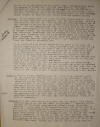
|
2.
1 January 1931.
Letter from Guido
Grossman to the Members of the
Provincial Board, Moravian Church, p. 2.
". . . should not
be afraid, and we will never find a
system, through which the enemies of
Christ will not find some cause to
criticize. Therefore as these new
suggestions in regard to the Collections
at the Holy Communion do not convinces
me that they are better, I would remain
by the method, which we had hitherto,
until we find something whereby we could
do away safely with the present system.
¶ Point 2. To pay Church Dues is a duty
of every church member. This we have to
hold fast, this is necessary for the
development of our Province, with the
aim of a self supporting province,
however far of this aim may be yet, yet
we have to have it in view. We are all
convinced that our congregations have to
do even more as they do now. I have been
speaking with many a one of our church
members, of whom I thought I could pay
attention to their opinion, I have not
found one Indian who complained that we
extract too much on church Due. I have
been speaking with men in different
walks of life, among them also
“Spaniards” and I have not yet found
one, who criticized u for expecting from
the Indians to pay $1.50 annually. In
the contrary one fund it extremely low.
¶ It is a duty of each church member we
all agree in that, that he pays his
dues. Then if it is a duty, then we
should also see that a church member
fulfills his duty. If not, what then?
According to the new suggestion they
shall be permitted to continue to come
to communion, but they shall be deprived
of the right to attend or vote any
congregation meetings (council). Of
course we have to explain it to them
that they are not permitted to vote
because they do not pay their church
dues, that again will bring on ill
feeling with the same effect, namely
criticism. Perhaps if a member pay only
one dollar a year and after having been
asked whether this was all what he could
do, he may be released of the rest and
not be forwarded as a debt to the next
year. But I am convinced of a member
persistently neglects his duty as a
church member, he or she cannot remain a
church member, that means a full member.
¶ Point 3. This is a good suggestion,
and if I would have remained pastor of
the Bluefields congregation, I would
have introduced this in Bluefields long
ago. I am sure this will help us and our
members among the creoles as well as
among the Indians. But I would suggest
that Bro. Heath or Bro. Danneberger
might write a letter to all the station,
or better still Br. C. C. Shimer as
Warden and that it is translated into
Miskito. This letter should explain
clearly why the change is made and what
the change means. By such a letter,
which is then read by the various
missionaries to his station and
outstation, the guarantee that the same
idea is conveyed to all members. The
individual missionary can still ad some
explanatory words, if he feels it
necessary. ¶ Point 4. It is not quite
clear to me what that all means. "The
church contribution as well as the
Sunday collections" "entirely at the
disposal of the local congregation
acting through its church commitee."
This seems to me impossible, this would
be too much liberty to a congregation
whose existence still depends largely on
the support from abroad. As I understand
it, that congregation would have liberty
to use the church dues as well, if that
church sees it necessary it may use it
then for local purposes only, Church
building, etc.? The church dues should
remain under the entire control of the
Warden of the Privince, and the P.B. and
if our esteemed Home board agrees that
then out of the Church dues the . . ."
|
|
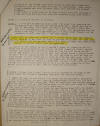
|
3.
1 January 1931.
Letter from Guido
Grossman to the Members of the
Provincial Board, Moravian Church, p. 3.
". . . salaries
of the Native ministers should be paid,
the evangelists are mostly paid by
“Friends or their own missionary” also
travelling expenses and such expenses
which will release the general treasury.
I too think it would help us to show
clearly what the Province is doing and
also what aid the province receives
still from abroad. ¶ Point 5.6. Nothing
special to mention. ¶ Point 7. I have
not changed my mind since 1920 when this
question was dismissed. This concerns
only non-members, and I cannot see why
we should not as from these who desire
our service a fixed sum for that
service, which we render to them. The
suggestion that we ask from them “thanks
offering” is a very ideal thought but in
practice it will come out to the same
thing. ¶ I again wish to state my
opinion that I do not think that the
Bandits and our enemies do not wish to
harm us, because we extract too much
money from our people, but the deepest
reason for their slander and persecution
is : because we preach Christ and Him
crucified. ¶ In regard to the school in
Pearl Lagoon I agree in principle and
Bro. Wolff has been speaking to me
already on that principle when I passed
through Bluefields. But before we jump
we have to look twice and see how we
manage it. Have we the men. That school
needs a proper trained man, a school
man. Bro. Wolff is the only one whom we
have at hand to take charge of that
school. He is going on furlough next
year. Will he come back? Although the
Doctor in Tubingen has found nothing
which would make her not to return to
Nicaragua and yet I have still my doubt
whether she will return. Then before he
could be the principle of that school he
would have to get a better knowledge of
Spanish. ¶ Before I close this letter I
would like to express my opinion on the
work among the “Spanish Speaking People”
on the Atlantic Coast. ¶ I think you
know me and that I have never let an
opportunity slip, when I can do
something in that line, by distributing
tracts out, but for a proper organized
work among that lass of people, we have
neither money or not the men. We have
not sufficient money to do our work
among the Indians why to burden
ourselves with still more work. ¶ You,
dear Brother Shimer, mentioned in your
letter June 20th to employ Senor
Gutierrez in our work. First of all have
we a right to pay $25.00 monthly which
is giving for “the furtherance of the
Gospel among Heathen” to use it for work
among Roman Catholics? I think no, you
may think differently, Bro. Heath I know
thinks quite differently. Furthermore
Sr. Gutierrez and especially Sra are
very strong Baptist in their view. Shall
we then support him and permit him to
work according to his own view? Or has
he agreed to our handbook? If we permit
him to work according to his own view,
will that not bring about talking. In
San Pedro Sula just this Baptist
question brought almost a split among
the members of the San Pedro Sula
congregation. ¶ You write, dear Brother
Shimer, “but it is high time that we are
up and doing something that is
distinctly Spanish” I am sorry but I
cannot see that. We are not sent to the
“Catholics” The Central American Mission
is, and that Mission has made itself
responsible for the coast of Nicaragua.
They say we would like to do it, but we
cannot do at present, for we have not
men nor means. Neither have we. We could
only commence distinct active . . ."
|
|
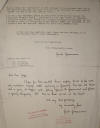
|
4.
1 January 1931.
Letter from Guido
Grossman to the Members of the
Provincial Board, Moravian Church, p. 4.
". . . work among
the “Spaniards” on the expense of the
present work which we have already, and
you know as well as myself, that we lack
already means and men to do the present
work. ¶ Or will our esteemed Board in
Bethlehem increase the budget for
distinct Spanish work? I personally
could only agree to commence distinct
active work among the “Spanish Speaking
Inhabitants of the Atlantic Coast of
Nicaragua, if our Board stands the
expenses of the Special men and special
means for that work, otherwise no. ¶ I
have written candidly about these
various matters, it is my opinion which
I have expressed. ¶ With my best
greetings ¶ very fraternally yours, ¶
(signed) Guido Grossman ¶ Copies are
sent to: ¶ Br. S. H. Gapp ¶ Br. C. C.
Shimer ¶ Br. O. Danneberger. ¶ Dear Bro.
Gapp:-- I hope you have reached home
safely. We are so far well, only
conditions develop rather seriously in
Germany. One does not know what is going
to happen next. Feeling against the
Government and France is growing
dangerously bad! But we know we are in
His hands. With my best greetings, very
sincerely yours, Guido Grossman"
|
|
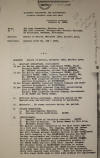
|
1.
3 January 1931.
Record of Events, December 1930, Eastern
Area. Col.
John Marston, Bluefields, to Jefe
Director GN, Managua, p. 1.
"January 3, 1931
¶ Subject : Record of Events, December
1930, Eastern Area. ¶ Reference: General
Order No. 140- 1929. ¶ -2- ¶ C. MILITARY
OPERATIONS. (Continued) ¶ 18 Dec Two
Marine amphibians, Lieutenant YOUNG,
Staff Sergeant WOODS, USMC, pilots,
Captain SCOTT, GN, Mr. HEPBURN
passengers, arrived from MANAGUA. ¶ 19
Dec Two Marine amphibians, Lieutenant
YOUNG, Staff Sergeant WOODS, USMC,
pilots, Captain SCOTT,GN, Mr. HEPBURN
passengers, departed for MANAGUA.
Captain WOOD inspected Seventh Company
and Headquarters Detachment, at
BLUEFIELDS. ¶ 29 Dec Colonel MARSTON
inspected Seventh Company and
Headquarters Detachment at BLUEFIELDS. ¶
31 Dec Lieutenant RIEWE returned from
duty establishing post at NEPTUNE MINE,
via PRINZAPOLKA. Captain WOOD inspected
Seventh Company detachments at EL BLUFF
and PUNTA GORDA. ¶ 2. Military duties
performed. Military police of the
Eastern Area and military training of
personnel. ¶ 3. Contacts. No enemy
contacts during the period. ¶ D. POLICE
OPERATIONS. ¶ 1. See Departmental
Reports. ¶ 2. General Police Conditions.
QUIET. ¶ E. INTELLIGENCE. ¶ 1. General
state of territory occupied. QUIET. ¶ 2.
Military situation. No known enemy in
this Area. ¶ 3. Economic Conditions. The
general economic condition of the East
Coast remains, in a very poor sate. The
logging, sawing and lumber mill business
in PUERTO CABEZAS is being closed down,
and will through several hundred natives
in the unemployed. The fruit industry in
the BLUEFIELDS section has made further
curtailments and limited orders for
fruit on account of the poor market
conditions in UNITED STATES. This action
will deprive many independent growers in
the PUNTA GORDA district from their
regular incomes. The business firms in
BLUEFIELDS continue to reduce their
stocks of merchandise and their holidays
orders, this year, were less than one
fourth of the quantities which have
usually been ordered. There are three
projects on this coast which seem to
hold some promise for improvement [...]"
|
|
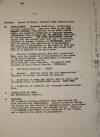
|
2.
3 January 1931.
Record of Events, December 1930, Eastern
Area. Col.
John Marston, Bluefields, to Jefe
Director GN, Managua, p. 2.
" […] -3- ¶
SUBJECT: Record of Events, December
1930, Eastern Area. ¶ E. INTELLIGENCE.
Economic Conditions. (Continued).. in
labor conditions. They are, work on the
RAMA-MANAGUA HIGHWAY, construction of
the PEARL LAGOON CANAL, and possible
resumption of business between
independent fruit growers and the
AMERICAN FRUIT CO., or its successors.
THE CUKRA DEVELOPMENT COMPANY report
that the current year will see a
substantial increase in customs revenue,
in BLUEFIELDS, which will be derived
from importation of merchandise. The
surplus of merchandise in the hands of
this company have been reduced so low
that new stocks will have to be imported
at an early date. ¶ 4. Friction between
Guardia and Civil populations, NONE,
with the exception of the murders of two
rasos in the Ninth Company. See
Department of Northern Bluefields
separate reports. ¶ Civil attitude
toward Guardia: In general GOOD.
Attitude of press toward Guardia:
FAVORABLE. ¶ 5. Political Situation.
QUIET. ¶ 6. Weather. Moderate rains and
cool temperatures, favorable to drills,
exercises and patrols. ¶ 7. Condition of
roads and trails, such as exist, and
including trails in NEPTUNE MINE region:
VERY GOOD. ¶ 8. Condition of telephone
and telegraph communications: GOOD. ¶ F.
CONFISCATION OF ARMS. See Departmental
reports. ¶ G. TRAINING. The standard
training schedules have been carried out
with satisfactory improvement. Special
attention during the period has been
devoted to emergency drills, preliminary
rifle practice exercises, and skirmish
drill. There is a noticeable improvement
in the discipline of the troops, and a
reduction in number of punishments. […]"
|
|
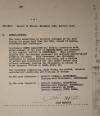
|
3.
3 January 1931.
Record of Events, December 1930, Eastern
Area. Col.
John Marston, Bluefields, to Jefe
Director GN, Managua, p. 3.
" [...] -4- ¶
SUBJECT: Record of Events, December
1930, Eastern Area. ¶ H. MISCELLANEOUS.
¶ The total reductions in enlisted
strength of the Area during the month
have been ten (10), caused by deaths,
desertions and discharges. ¶ Lieutenant
RIEWE completed his duty in connection
with establishment of the post of
NEPTUNE MINE, and returned to his
regular station in BLUEFIELDS. This
officer reports that the Guardia
personnel are suitably quartered, and
properly rationed. This detachment was
thoroughly instructed in taking defense
positions, and a routine of drills and
instruction put into effect before this
officers returned, leaving the
detachment in charge of First Sergeant
Wilfred A. DASH, #960, GN. ¶ The
following inspections made during the
period, revealed satisfactory conditions
and training of troops: ¶ By the Area
Commander: Seventh Company, BLUEFIELDS.
¶ Headquarters Detachment, BLUEFIELDS. ¶
By The Area Inspector: Seventh Company,
BLUEFIELDS. ¶ Headquarters Company,
BLUEFIELDS. Seventh Company, EL BLUFF. ¶
Seventh Company, PUNTA GORDA. ¶ (Signed)
JOHN MARSTON"
|
|
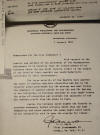
|
7 January
1931.
Memorandum for Area Commander,
Lt. C. A. Davis,
Bluefields.
"7 January 1931 ¶
Memorandum for the Area Commander: ¶
With respect to the comfort and welfare
of the personnel of the Headquarters
Detachment it is believed that the
establishment of an Exchange where the
men might receive credit to the extent
of one third of their monthly pay would
materially contribute to their
contentment. ¶ The large majority of the
Guardia have acquired the habit of
smoking American cigarettes but due to
the recently added government tax the
average man must forego the pleasure of
smoking except on pay day and for the
day or two following—An Exchange
operated at cost would reduce the price
of cigarettes and preclude the necessity
of the men seeking credit from the shops
in town. ¶ Again—the Exchange would
enable the Guardia to purchase necessary
toilet articles which they now deny
themselves and might develop the candy
habit which would in all probability
curb in some the craving for liquor. ¶
(signed) C. A. Davis First Lieutenant,
GN Comdc..Hq. Det.. E. A."
|
|
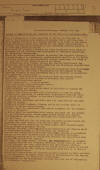
|
10 January
1931.
Program of Organization and Operation of
the Misquito Industrial Corp,
H. A. Grant
Watson, Bluefields. In
cable from Stanford London, Managua, to
British Foreign Office, London, p. 1.
"That a
Delegation of Seven (consisting of
Indians and Creoles) be sent to the
President and Congress at Managua with a
petition which shall request the grant
of a special Charter to be given to the
above name Corporation which shall
embody all the rights and privileges
accorded the Indians and Creoles of the
Nicaraguan Atlantic Coast by the
Harrison Altamirano Treaty. ¶ There
shall be appended a request for other
privileges which shall be necessary for
the promotion and development of
Industrial, Commercial, and Educational
Enterprises. ¶ Should the above
mentioned charter be granted, “The
Misquito Industrial Corporation, shall
be immediately organized, which shall be
an All Native Industrial, Commercial,
and Educational concern consisting of a
stock of not less than 50,000 shares at
$50.00 per share. ¶ The Corporation
shall promote develop and improve
industrially the Educational,
Agricultural, Mineral, Commercial and
Economical possibilities of the Atlantic
Coast of Nicaragua. ¶ The Agricultural
Department shall cultivate extensively
such production as wil yield the most
profit economically the development of
the different branches of this
department shall be operated in
conjunction with Industrial
Institutions. ¶ A. CEREALS., Rice, Corn,
Beans and Pease, for Home and Foreign
market. VEGETABLES. Such as will prosper
in climate. Home Market. ¶ TROPICAL
VEGETABLE, Home market. ¶ FRUITS, COCOA,
COFFEE. –(Foreign market) CITRIC FRUIS,
and other marketable fruits. ¶
PINEAPPLES, COCO NUTS, SUGAR CANE. ¶
MODERN MACHINERY AND POWER MILLS SHALL
BE INSTALLED TO CLEANSE AND PREPARE
PRODUCTS FOR MARKET. ¶ BANANAS., This
staple product will necessitate a large
Sea going loading plant consisting of
Steam Power Barges Motor Tugs, and steel
and wooden lighters equipped to
facilitate transportation to point or
station of loading. ¶ TIMBER CUTTING.
Machinery and Mills shall be installed
for the manufacture of Lumber. ¶ CATTLE
AND POULTRY farming. Foreign cattle and
poultry shall be imported to improve
native breeds. ¶ Factories shall be
established with modern equipment for
the manufacture of biproducts. ¶
Factories shall be established with
modern machinery for the manufacture of
furniture, Casava Starch, Sugar, basket
making, Shoe making. Tailoring, Ladies
Millinery and Tailoring, Tool Handles,
coconut Oil, Coco Nut Mats. ¶ DRY DOCK
and SHIP WAYS for building and repairing
loading Plants and coastwise and rive
service with machine repair shop. River
steam service consisting of Stern Paddle
wheel steamers, which will be placed on
navigable Rivers. ¶ COMMERCIAL
INDUSTRY., Office, Commissaries,
Warehouses and Wharves shall be
established wherever it is profitable
and necessary. SCHOOLS., Two Industrial
(Institutions) institutes capable of
accommodating 300 pupils shall be
established in two different districts.
Elementary schools shall be established
wherever the Corporation establishes an
agricultural station. ¶ Hospitals, One
large general Hospital and Dispensary
shall be erected. One special Hospital
for Pulmonary Diseases. Branch Hospital
shall be erected wherever the Corp.,
establishes an agricultural station.
Mining Industry., the exploiting of the
mining district shall be carried on by
prospecting for the different minerals
which have up to the present been
undiscovered. ¶ Special privileges which
he Corporation shall request in their
petition to the Nicaraguan Government
which shall be established for the
improvement of Commercial and
Educational enterprises. Establishment
of two Radiographic stations for sole
use of Corporation and Industrial
Instruction. [...]"
|
|
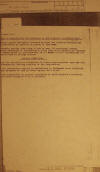
|
10 January
1931.
Program of Organization and Operation of
the Misquito Industrial Corp,
H. A. Grant
Watson, Bluefields. In
cable from Stanford London, Managua, to
British Foreign Office, London, p. 2.
"[...] Sheet No.
2. ¶ Telephone system throughout
Corporation farm. Two aviation Stations
for instruction of aviation to pupils of
Institute. ¶ Steamship service
consisting of two or more (if necessary)
modern equipped Steamships of
approximately 2,000 tons cargo capacity,
oil burners (--) screws Speed., of
approximately 16 ½ knots is also
contemplated for importation to foreign
market. ¶ SPECIAL PRIVILEGES ¶ (--) for
unrestricted navigation of rivers,
lakes, adjacent seas and air of,
Nicaragua, by floating property of the
Corporation. ¶ (---) the Corporation
exploit by agriculture in different
rural districts ¶ (--) any hectares of
land as their capital will allow. ¶
(---) the Corporation be granted
permission to build Miniature Railroads
to facilitate transportation of
products."
|
|
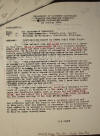
|
13 January
1931.
Confidential Report on Pedro Pablo Perez
Gallo, Capt. H.
N. Stent, Puerto Cabezas, to Col.
John Marston, Bluefields.
"CONFIDENTIAL. 1.
The subject name man GALLO practices as
a lawyer in this port. He is a
Conservative. He is a constant
troublemaker, and among the more
intelligent natives here he has that
reputation. He misses no chance of
attempting to embarrass the Guardia even
to the extent of sending radios to the
Court of Appeals in Bluefields which are
either deliberately misleading or false.
¶ 2. This man presents himself and
volunteers himself to handle as a lawyer
any case whereby he may, through
misquoting the law, place the Guardia in
a bad light. Upon every possible
occasion he attempts to have printed
newspaper articles derogatory to the
Guardia. Among the less intelligent
natives, GALLO poses as a lawyer with a
consummate knowledge of the law and
impresses them, by quoting laws showing
wherein the Guardia is oppressing them,
and depriving them of their rights. It
has been reported to me that upon more
than one occasion GALLO has made
speeches agitating against the Guardia,
but I have been unable to catch him in
such (---) as yet. ¶ 3. For your
information, GALLO sent messages to the
Court of Appeals in Bluefields in the
cases of Jose Angel Gonzales and
Candilaria Lopez, both of which did not
state true facts, and the letter was a
falsification. Also Gallo initiated all
the letter writing in the case of Dr.
Mongalo. ¶ 4. Gallo has become such a
constant nuisance and bad influence
against the Guardia and the Government
in General in this port, that his
removal is requested. It is recommended
that authority be secured to transport
this man to either Managua or Leon,
where his activities will be more
restricted, and where he will be under
surveillance. H N STENT"
|
|
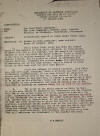
|
17 January
1931.
Confidential Report on Pedro Pablo Perez
Gallo, Lt. W. W.
Benson, Puerto Cabezas, to Col.
John Marston, Bluefields.
"1. Pedro Pablo
Perez Gallo has been the direct cause of
the release of Jose Angel Gonzales.
He volunteered to serve Gonzales as his
attorney, and the result is Gonzales’
release on bond furnished by the Gallo
himself. Gallo’s interest in the
case is neither monetary nor a desire
that Gonzales receive justice, but is
purely an effort to embarrass the
Guardia Nacional. Gonzales has
neither money nor opportunity of
obtaining any in the near future.
Gallo’s radios to Bluefields in this
case cost more than $10.00. ¶
2. Since the release of Andres Calderon,
Jose Calazan and Jose Angel Gonzales,
Gallo’s attitudes have been one of
dictatorial condescension. He had
made himself so obnoxious around this
office that he was this date ordered to
get out and stay out, unless he was sent
for, or unless a prisoner asked that he
be called as his attorney. Gallo
has no sense of dignity of a member of
his profession, nor does he exhibit any
of the qualities of courtesy so common
among that natives of his country.
¶ 3. The point of the whole report
on Gallo is that it is his sole desire
to embarrass the Government and the
Guardia. Very few of the better
class of citizen associate with him.
Sr. Arana, Conservative Candidate for
Deputy in the November election did not
recognize him in any way. The
other lawyers here, Dr. Luis F.M.
Acevedo and Dr. Eudoro Baca, do not
associate with Gallo, nor do they use
their positions to place the Guardia in
an unfavorable position. Lieutenant
Darrah states that in the past Drs.
Acevedo and Baca have aided him
materially, but at no time has Gallo
done anything but attempt to complicate
matters. Gallo’s position is
positively anti-Government,
anti-Guardia, and pro-anything else that
will embarrass the Government or the
Guardia Nacional."
|
|
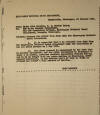
|
22 January
1931.
Request for relief from duty with the
Nicaraguan National Guard Detachment,
Col. John
Marston, Bluefields, to John A.
Lejeune, Major General Commandant,
Washington D.C.
"1. It is
requested that I be relieved from duty
from the Nicaraguan National Guard
Detachment upon the completion of two
years service on May 1, 1931. ¶ 2.
The above request is occasioned by the
fact that my present assignment and any
other assignment in Nicaragua to which I
am liable, involves complete separation
from my family, and it is my belief that
two years service in Nicaragua, under
present conditions, is the extreme limit
of time in which an officer can render a
full measure of service."
|
|

|
23 January
1931.
Pedro Pablo Gallo and his connection
with criminal cases under the
jurisdiction of the District Court,
Puerto Cabezas.
Col. John
Marston, Bluefields, to Jefe
Director GN, Managua.
"1. The attached
enclosures are descriptive of a
condition of affairs in Puerto Cabezas
which should be corrected. Pedro
Pablo Gallo is a rather clever man.
He caused the Guardia some anxiety in
Bluefields last year when he was
practicing before the local courts. His
tactics were the same as those he is now
using in Puerto Cabezas. The
liberal provisions of the law which
permit the granting of release on bail
to almost any civil prisoner when almost
any citizen, with or without property,
will go his bond, makes it possible for
an “abogado” to remove a prisoner from
the custody of the Guardia Nacional at
any time. ¶ 2. It is
believed that Gallo should be removed
from the scene of his present activities
if this can be done legally and without
too much trouble. It should be borne in
mind that the man usually acts within
the law. The chief objection to
his methods is he obviously is out to
embarrass the Guardia Nacional on every
possible occasion."
|
|
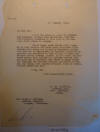
|
26 January
1931.
Letter from Gen.
C. B. Matthews, Acting Jefe
Director GN, Managua, to Charge
d'Affaires, US Legation Managua,
conveying telegram from
Col. John
Marston, Bluefields, Re Albert
Fagot.
"Albert Fagot Agent United Fruit Company
at Cabo Gracias and forty years
residence there arrived here today and
states he discounts reports Cabo Gracias
is threatened and believes depredations
reported are committed by band of men
recently discharged Puerto Cabezas. He
has heard and believed rumors that
Sandino has fifteen hundred well
equipped men in Honduras with which he
plans vigorous campaign and possible
general revolution in coming dry season
with Segovia probable scene of action.
Marston 14324 JAN. 31."
|
|

|
27 January
1931.
Telegram from
Bragmans Bluff Lumber Co., Puerto
Cabezas, to Navy Department, forwarded
to Department of State.
"Two hundred well
armed Sandinist bandits are in the
Saclin district of the Wanks river,
their object being looting, destroying
property and capturing Americans.
It is reported that they are preparing
to attack Logtown at end of our railway.
Consider the situation warrants
immediate protection by gunboat."
|
|
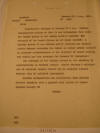
|
27 January
1931 (5 p.m.).
Telegram from US
Consul Sumner, Managua, to Sec.
State Washington D.C.
"Department's
telegram of 10 January 27 1 p.m. Guardia
Headquarters informs me that it has
information that there are bandit groups
in the Saklin section. The strength of
the bandit forces is not known. A
guardia patrol of one officer and 17
enlisted men cleared Puerto Cabezas
yesterday for Saklin on combat patrol.
An airplane reconnaissance of the
vicinity of Puerto Cabezas and Saklin
has been arranged for January 28.
The strength of the Guardia forces in
the vicinity is approximately as
follows: Puerto Cabezas 5 officers
and 43 enlisted, Toledo Wye 11 enlisted,
Neptune Mine 10 enlisted. Guardia
Headquarters has information from
Special Service Squadron that a gunboat
will arrive at Puerto Cabezas January
28. Sumner."
|
|
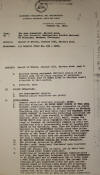
|
31 January
1931.
Record of Events, January 1931, Eastern
Area, Col. John
Marston, Bluefields, to Jefe
Director GN, Managua, p. 1.
" . . . Military Situation: NO KNOWN
ENEMY FORCES IN THIS AREA. ¶
2. Military duties performed. Military
police of the Eastern Area and military
training of personnel. Combat
patrol sent to Wanks River to develop
bandit situation in that section.
¶ 3. Contacts: none. ¶
D. Police Operations ¶ 1.
See Departmental reports. ¶
2. General police conditions are quiet.
¶ E. Intelligence ¶ 1.
General state of territory occupied:
QUIET. ¶ 2. Military
situation. NO KNOWN ENEMY FORCES IN THIS
AREA ¶ 3. Economic
conditions. The economic
depression is slowly getting worse.
Conditions in the Department of Northern
Bluefields will get much worse since the
BRAGMANS BLUFF LUMBER COMPANY is
drastically curtailing operations and
will close this large saw-mill in PUERTO
CABEZAS in February. Fruit orders are
still small, those the UNITED FRUIT ship
calls regularly every week for its cargo
of bananas. An independent company
is still experimenting with a
twice-monthly cargo of bananas purchased
on the Escondido, Rama, Mico, and Siquia
rivers. Receipts in the BLUEFIELDS
customs house have fallen off with no
promise of immediate recovery. The
extreme poverty of the “mozo” class is
becoming increasingly evident. Petty
crimes have not noticeably increased but
such a condition can be looked for at
any time. ¶ 4. NO FRICTION
BETWEEN THE GUARDIA AND CIVIL
POPULATION. ¶ 5. The
political situation is QUIET. ¶
6. Weather: good. Occasional
“northers” make coastwise travel
uncomfortable. ¶ 7.
Roads and trails, such as exist, are in
their best conditions. River
travel excellent. ¶ 8.
Conditions of telephone and telegraph
communications are fair. The
important telephone line from BLUEFIELDS
to EL BLUFF goes out of commissions two
or three times a week owing to its poor
condition. The present line
consists of part underwater cable and
part spliced exposed wires of various
kinds which are frequently torn down
during the high winds of this season.
The line should be overhauled and the
exposed wire replaced with cable.
This is an urgent matter since the
military situation as well as the local
commercial . . . "
|
|

|
31 January
1931.
Record of Events, January 1931, Eastern
Area, Col. John
Marston, Bluefields, to Jefe
Director GN, Managua, p. 2.
" . . . F.
CONFISCATION OF ARMS. ¶ See
Departmental reports. ¶ G.
TRAINING. ¶ Training
continues with satisfactory progress.
¶ H. MISCELLANEOUS. ¶
The Eastern Area has lost 3 officers and
5 enlisted men cue to discharges and
transfers during the month of January.
¶ The following inspections made
during this period revealed no
irregularities of note: ¶ By
the Area Medical Officer: Ninth
Company, PUERTO CABEZAS. Seventh
Company, PUNTA GORDA. . . . "
|
|

|
1.
2 February 1931.
Conditions in the District of Rama,
Department of Southern Bluefields.
Col. John
Marston, Bluefields, to Jefe
Director GN, Managua, p. 1.
"The following
letter from Colonel J. Marston, G.N.,
Commanding the Eastern Area, is quoted
as of particular inerest concerning some
of the economic conditions in the
District of Rama: ¶ “GUARDIA NACIONAL DE
NICARAGUA, CUAREL GENERAL, Area del Este
Bluefields, Nicaragua. 2 Fe. 1931. ¶
From: The Area Commander. ¶ To: The Jefe
Director. ¶ Subject: Conditions in the
District of Rama, Department of Southern
Bluefields. ¶ Reference: (a) Radio
Message #12431 Jan 31 JD to AC, EA. ¶
“1. The frequent mention of the Planters
Association of Rama in despatches and
letters originating in this office leads
me to believe that a brief outline of
the activities of this association and
the conditions existing on the
Escondido, Siquia, Mico and Rama rivers
may be desirable. ¶ “2. For a number of
years, up until last spring, two fruit
companies were purchasing bananas in
competition with one another on the
above mentioned rivers. The companies
were the Cuyamel Fruit Company and the
American Fruit Company. The former owns
a number of large banana plantings on
the rivers but augmented its own crop by
purchasing 5000 to 6000 stems weekly
from independent planters. The American
Fruit Company bought in the same market
(not owning any land itself) about 4000
to 5000 stems weekly. The price per
“count bunch” (a theoretical stem having
nine “hands” of bunches) was about 50
cents. While this competitive buying was
on, Angel Mallona, a naturalized
Nicaraguan of Spanish birth, organized
most of the independent planters on the
four rivers into an association with the
view of demanding and getting higher
prices for the fruit sold to the two
buying companies. ¶ “3. There are
hundreds of small planters on these
rivers raising from ten to twenty stems
of bananas a week. A few [...]"
|
|

|
2.
2 February 1931.
Conditions in the District of Rama,
Department of Southern Bluefields.
Col. John
Marston, Bluefields, to Jefe
Director GN, Managua, p. 2.
"[...] 3. There
are hundreds of small planters on those
rivers raising from ten to twenty stems
of banana a week. A few are larger
landholders and some raise as many at
150 to 300 stems weekly. The dues to the
association were $1.00 per week from
every member, regardless of the amount
of fruit sold. I think two or three
hundred planters joined the association
originally. Mallona, who is not a
planter but a merchant of considerable
means living in Rama, was the man who
managed the field work of the
association, and Senator Sandoval of
Bluefields, who owns a small plantation
himself near Rama, was the Bluefields
manager. Both, I believe, receive a
salary from the association. A number of
“river captains” were appointed, for the
most part non-planters, who ”ran” the
association’s affairs on the rivers. ¶
“4. Last spring the Amerian Fruit
Company failed and has not resumed
operations. It still owes a large sum of
money for fruit purchased from planters.
The Cuyamel Fruit Company was absorbed
by the United Fruit Company which
immediately adopted a retrenchment
policy and has ceased to purchase
“outside” fruit from any but those
independent planters with whom the old
Cuyamel company had contracts. For at
least six months, the independents sold
no fruit for exportation. Three or four
months ago, the Mexican Traders
Steamship Co. sent a small ship here and
made an experiment of buying bananas
from the association for 65 cents per
count bunch, the association to(--) the
leading. The men in Bluefiels connected
with this experimental cargo found that
the association was unable to load fruit
properly and much of the original cargo
was damaged by handling. This , at
least, is the contention of every person
interested in the shipment (excepting,
of course, the association). I
understand the association allowed the
planter (- - -) cents a stem for the
fruit he delivered and retained 35 cens
to cover salaries and costs of loading.
The profits from loading were to be
divided among the planter members on a
pro-rata basis. ¶ “5. The orginal
”contract” (verbal only, I believe),
called for three shiploads at two-week
intervals. These load- [...]"
|
|
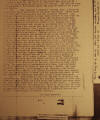
|
3.
2 February 1931.
Conditions in the District of Rama,
Department of Southern Bluefields.
Col. John
Marston, Bluefields, to Jefe
Director GN, Managua, p. 3.
"[...] 5. The
original “contract” (verbal only, I
believe) called for three shiploads at
two-week intervals. Those loadings were
duly accomplished and the contract
expired. The Mexican Trader Steamship
Company then offered to buy fruit at 30
cents per count bunch and assume the
loading themselves. This is the center
and nub of the entire controversy. Many
planters wanted to accept the offer of
the company, but the association
declined and issued an ultimatum that no
member should cut fruit for anyone who
would not purchase from the association
officials. The “river captains” passed
the word that all fruit cut for the
Mexican Traders would be “cut up”
(destroyed with a machete). This is
easily accomplished since bananas after
cutting are placed on the river bank at
designated places for the boat or barge
making the pick-up. The planter may be
absent for extended periods packing in
bananas from the plantation lying back
from the river. Conference after
conference was held, the representative
of the Mexican Traders Company finally
stating he would return to the United
States and discontinue any further
attempts to make a deal with the
planters. At this juncture, the Jefe
Politico received authority to issue his
proclamation. Encouraged by this move,
the Mexican Traders Company
representative ordered another ship to
Bluefields and it successfully picked up
a very good cargo at 30 cents a stem.
The recent “trouble” occurred last week
when the river captains of the
association passed the word up the
various rivers that it would not allow
any fruit to be delivered to the ship
expected in Rama next week. The
association undoubtedly did issue this
statement but I am inclined to think it
was merely a bluff. The Jefe Politico,
however, acted promptly and properly,
and hailed the association chiefs into
Bluefields where they were warned that
the proclamation “stood” and the
deportation would follow any attempt to
encourage disorder on the rivers
concerned. ¶ “6. This morning I had all
the men in my office and endeavored to
explain to them the economic phases of
their problem and advised them that any
price was better than none under the
depressed conditions now existing on the
coast. I assured them that there was no
prospective customer other than the
Mexican Traders Company and recommended
that they endeavor to reach an agreement
with it until competitive companies
entered the field. I anticipate no
further trouble. (signed) John Marston."
|
|
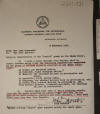
|
2 February
1931.
Depredations of the "bandit" group on
the Wanks River.
Col. John
Marston, Bluefields (conveying
radio message of
Capt. Wood, Puerto Cabezas) to
Jefe Director GN, Managua.
"I have a
radio message from Captain Wood in
Puerto Cabezas, which lists the
following depredations committed by the
group of outlaws recently reported on
the Wanks (Coco) River: At Craza:
one murdered Indian. At Kisalaya:
eight shotguns stolen.* At
Waspook: two thousand dollars in
merchandise and money. At
Aguasbila: forty cattle taken. At
Sangsang: six hundred dollars loss in
merchandise, etc. At Ulwas: four
hundred dollars in merchandise, etc.
From Antonio Alvarez, itinerant
merchant: two thousand dollars in
merchandise. Captain Wood adds
that it was a foraging expedition and
the group consisted of twenty-eight (28)
men. No report as to their
probable identity has been received.
I very much doubt that they came from
Segovia. //
*Muzzle loading "pigeon" guns adapted
soley for small game."
|
|
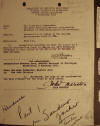
|
4 February
1931.
Transmittal of copies of the Sandino
Proclamation found in CUM,
Lt. W. W. Benson,
Puerto Cabezas, to Col. John Marston,
Bluefields, p. 1.
"DEPARTMENT OF
NORTHERN BLUEFIELDS ¶ GUARDIA NACIONAL
DE NICARGUA ¶ PUERTO CABEZAS, NICARAGUA
¶ 4 February 1931 ¶ From: The Department
Commander. ¶ To: The Area Commander,
Eastern Area, Guardia ¶ Nacional de
Nicaragua, Bluefields, Nicaragua. ¶
Subject: Transmittal of copies of the
Sandino Proclamation found in CUM. ¶
Enclosures: Four (4). ¶ 1. Transmittal
herewith are Four (4) copies of a
Sandino proclamation found in CUM, on
the COCO RIVER, and forwarded to this
office by the Collector of Customs in
CABO GRACIAS. ¶ W. W. BENSON ¶ 1st
endorsement. ¶ Headquarters Eastern
Area, Guardia Nacional de Nicaragua, ¶
Bluefields, 5 February 1931. ¶ From: The
Area Commander, Eastern Area ¶ To: The
Jefe Director ¶ 1. Forwarded. One copy
of the proclamation has been retained
for the files of this office. ¶ (signed)
JOHN MARSTON"
|
|
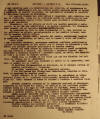
|
4 February
1931.
Transmittal of copies of the Sandino
Proclamation found in CUM,
Lt. W. W. Benson,
Puerto Cabezas, to Col. John
Marston, Bluefields, p. 2.
"MANIFIESTO A
OBFREROS Y CAMPESINOS NICARAGUENSES. ¶
Es muy sensible para los observadores
del exterior, el converserce de la
ingrata indiferencia con que nuestro
pueblo aparenta mirar el saqueo y
asesinato en nuestra Republica, por
mercenarios soldados al servicio de
Banqueros yanquis en Nicaragua ¶ Los
pueblos siempre han sido nobles y
generosos, pero arrastrados por el
POPULACHO, quien los ha humillado cuando
ha querido, los ha lanzado a destrozarse
pueblo contra pueblo para provecho y
satisfaccion del mismo populacho. ¶ Sin
embargo, soy el primero en decir que
nuestro generoso y noble pueblo, no es
que sea indiferente a su propia
desgracia. No. Nicaragua esta pasando
por un terrible periodo de confusion. La
confusion ha sido la base fundamental de
la obra criminal de los politicos de
oficio, principalmente en los pueblos
jovenes, como los de nuestra AMERICA
RACIAL. ¶ Populacho: quiere decir,
escoria del pueblo, ambiciosos, hombres
de instintos criminals, es decir, son la
remora y dolor del pueblo. ¶ AHORA BIEN:
A ese populacho monstruo, pertenecen
nuestros politicos profesionales quienes
estupidamente se han creido con el
derecho de imponerse y contratos con
poderes extranos extranjeros en nuestro
nombre. ¶ Cuando por esos abusos de
nuestros mandatarios hemos protestado
nos han disuelto a balazos, han
destruido a nuestros hogares, han
asesinado a nuestras mujeres y a
nuestros hijos, es decir, han sembrado
el luto y el dolor en nuestro pueblo. ¶
Hasta hoy, la espada de dos filos que
nos han blandido los politicos de
oficio, es la ignorancia. ¶ El populacho
sabe que, teniendo al pueblo en la
ignorancia, combate al pueblo con el
pueblo. ¶ La politica Norteamericana en
Nicaragua, es la primera persona en
nuestra destruccion y verguenza.. ¶ El
partido Conservador, es la siguiente
persona. ¶ Y los dirijentes del
Liberalismo desclerado, completan la
Trinidad, de asesinos de nuestro pueblo.
¶ PUEBLO HERMANO: Si el invasor asesino
ha encontrado un incondicional aliado en
el populacho nicaraguense, nosotros
tambien, los hijos del pueblo tenemos el
deber de unirnos y combatir a nuestros
verdugos. ¶ NUESTRO Ejercito Defensor de
la Soberania Nacional de Nicaragua,
compuesto de los hijos del pueblo, se
desligo de los politicos profesionales
desde el 4 de Mayo de 1927 cuando en
Tipitapa, Boaco y Teustepe el populacho
Nicaraguense, descaradamente pretendio
entregar desarmando a nuestro pueblo, en
manos del asesino yanquee invasor. ¶
Desde aquella Dolorosa Epoca, el pueblo
nicaraguense representado en nuestro
Ejercito, se improvise sus Jefes, y me
supe en honra haber sido designado su
Jefe Supremo, y nos hemos defendido como
hombes libres. ¶ Venid hermanos: dadme
la mano y libertemonos para honra de las
venideras generaciones y ejemplo de los
otros pueblos oprimidos. ¶ CUARTEL
GENERAL DEL EJERCITO DEFENSOR DE LA
SOBERANIA NACIONAL. ¶ PATRIA Y LIBERTAD,
NOVIEMBRE 20 DE 1930. ¶ (Firma original)
A. C. Sandino, ¶ Cesar Augusto Sandino.
¶ Un sello."
|
|
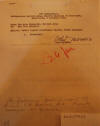
|
1.
5 February 1931.
Patrol Report,
Lt. Clyde Darrah, 9th Co. Guardia
Nacional, to Col. John Marston,
Bluefields, p. 1.
|
|
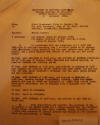
|
2.
5 February 1931.
Patrol Report,
Lt. Clyde Darrah, 9th Co. Guardia
Nacional, to Col. John Marston,
Bluefields, p. 2.
|
|
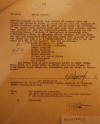
|
3.
5 February 1931.
Patrol Report,
Lt. Clyde Darrah, 9th Co. Guardia
Nacional, to Col. John Marston,
Bluefields, p. 3.
|
|
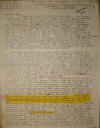
|
5 February
1931.
Letter from G. R.
Heath, Moravian Church Station,
Kaurkira, Nic., to Br. Gapp, Cape
Gracias, p. 1.
"Dear Br. Gapp, ¶
Thank you for your letter of January
14th. Br. Shimer is quite right about
the matter of my salary, as I had
already explained to Br. De Schweinitz:
but I thank the Board for its kindly
feeling. ¶ There is some slight
inaccuracy about the information
forwarded to you about Kaurkira. We
began to CUT (not to plant) posts on
November 18th: I think it was Friday
21st when we began to plant. The house
we made was simply a “longhouse”; that
is, a structure consisting of posts and
a thatch roof. It will be used as a camp
and carpenters’ work-shop at first; but
may be improved into the first school or
church later on. The difficulty at
Kaurkira is that there is nothing at all
there which can do the work of boards.
Lumber is cheap enough here; (at C.
Gracias), but as you know, the customs
regulations between the two countries
form a troublesome barrier, even though
native products are free from duty.
However, we hope to get over that
difficulty soon; but it will cause us
much extra expense. Meanwhile I was in
Kaurkira again from January 20th to
28th, evangelizing, getting better
acquainted with the people and preparing
more fully for the building operations.
¶ Now let me also thank you for your
longer letter of November 14th. I was
not aware that I had mentioned the “Own
Missionary” policy: if I did so, it was
a slip for “Our Evangelist”, which is
quite a different matter. Since the
question has been raised, however,
permit me to suggest that I think “Own
Station” (or “Own School”) would be
better than “Own Missionary”, the
missionary in charge of that particular
branch of work becoming “Own Missionary”
for the time being. Take my own case. I
was for a few years “Own Missionary” for
Fairview, which raised nearly half my
salary. But from 1904 till to-day I have
also been “O.M.” for the Living Waters
Missionary Union of Eastbourne, England,
which contributes $240 annually. Their
grant followed me from the Indian work
to Bluefields in 1910; back again to
Indian work in 1914; to Jamaica in 1926;
and back again to the Indian work in
1930! ¶ But as to the Evangelists. I
quite understand that it is very
interesting for a group or a person at
home to take up the support of an
Evangelist. But it is demoralizing to
the worker and still more so to the
native church to be so entirely
dependent on the Home Board. Our book of
Order says that when a certain defined
amount of progress has been made towards
self-government, THEN there shall be
made in our Provincial Accounts a
definite distinction between native and
foreign funds. I venture to hold very
strongly, with Bishops Hamilton and
Hennig, that THAT DISTINCTION SHOULD BE
MADE FROM THE VERY FIRST. We can indeed
tell our Indians with a clear conscience
that no part of their annual church
contributions goes into our own pocket;
because the sum total of these
contributions is scarcely sufficient. I
believe, to cover the sum total of other
expenses apart from missionaries’
salaries. But our present system of
accounting, and the clear words of our
Brotherly Agreement make it pretty plain
that the Administrative Board (S.P.G.)
makes itself responsible for ALL
expenses, and that our members are
obligated to assist in bearing ALL these
burdens. Now I urge that FROM THE FIRST
it be made clear to our Honduras Indians
that they have nothing at all to do with
the missionary’s maintenance or home;
but that they bear the sole
responsibility for supporting native
teachers and evangelists. If this burden
is really too much for them, a grant in
aid, well-defined and strictly
temporary, could be made by the Home
Board. But Indian workers should be
strictly the agents of the Indian
churches, not the paid workers of a
foreign board. It will obviously be
difficult to put this policy into force
in Honduras apart from Nicaragua: but I
would rather it were . . . "
|
|
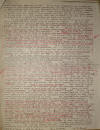
|
5 February
1931.
Letter from G. R.
Heath, Moravian Church Station,
Kaurkira, Nic., to Br. Gapp, Cape
Gracias, p. 2.
". . . done there
only than not at all. It is very
tempting to me to take advantage of
privately-proffered generosity and ask
for the support of one or more
evangelists; but I am convinced that I
should be making a mistake if I were to
do so: a mistake that would revenge
itself in later years. I realize that
the course I have mapped out will put
the spiritual quality of our work to a
very severe test; but it seems to me
that if I shrink from that test I should
be lacking in faith and courage. ¶ It
may possibly happen that the native
brethren may have to bear heavy
responsibility sooner than we expect or
desire. By the time this reaches you,
you may already have heard rumours of
fresh bandit outbreaks: and with the
present greatly disturbed condition of
the whole world we do not know what it
may all lead to. As far as I can
ascertain, attacks have been made on
Krasa (near Asang), San Carlos,
Sangsang, Waspuk, and Sakling (near
Bilwaskarma). Br. Allen Mueller, who is
in charge of the Asmussen shop at
Waspuk, and acts as our catechist
(evangelist) there, is just now in town.
He reports that the store was cleaned
out; but that no personal violence was
done to him, except that he was deprived
of one or two of his belongings. He has
heard, however, that the Evangelists
Leopold Omeir and Ignatius Maibit were
robbed of all they possessed, and that
one or more of our Krasa Christians were
killed: but these rumours lack
confirmation. It is certain that Anaiyo
at Wirapani, Dannery Downs at
Bilwaskarma, and the Haglunds at Wasla
were left unmolested. It is claimed that
the bandits have retired again to the
hill-country. The captain of this band
is a former acquaintance of mine: but
perhaps he would not care to know me in
these days. May I beg you very earnestly
not to publish in the church papers
anything more than the most necessary
meager statement of facts, and that only
when the facts are well authenticated?
We do not know for certain yet what
happened above Waspuk. As Christians, we
cannot but abhor all violence, and I
trust we shall not be afraid to say so.
But this whole bandit movement is more
complicated than appears on the surface,
and probably has a great deal of
political significance. The wildest
rumours are afloat, among which the most
emphatic sometimes are mutually
contradictory. Some say that the murder
of Jose Lleset was unauthorized, and
that the perpetrators have been
punished. It is generally agreed that
Lleset brought the trouble upon himself.
Some say that no Indians or missionaries
or other neutral people will be
molested, unless indeed they offer
resistance. Others say that all
Americans are to be wiped out, and that
our Christians will suffer because they
belong to an “American mission”—this I
can scarcely believe. But everyone
agrees that the whole movement is
directed against the American marines:
and here I think is where we must keep
out of politics. Have you read “Dollar
Diplomacy”, by two authors whose names I
forget? If not, by all means try to get
hold of it: very coldly and
dispassionately it gives what seems to
be a true account of the situation down
here, in many cases citing the official
documents in full. But besides this
general issue, there are a number of
personal grievances which cause rancor.
The earlier marines, under Major Butler,
behaved well, I can testify to that as
concerns the years 1910 and 1912. But it
is claimed that those who have been here
more recently behaved very badly. Some
are said to have been recently lynched
in Corinto for outraging Nicaragua women
On this river there is a little place
–or rather, there WAS—called Kilali,
some days above Bocay. It is claimed
that when the marines were up there,
they had a rather disastrous encounter
with the Sandinistas in that district.
Afterward in the mistaken belief that
Kilali was a bandit camp, they bombed
the place and destroyed all the
inhabitants. I do not know whether the
story is true; but IT IS BELIEVED; and
so long as it is believed it will never
be forgiven. In the midst of this
confusion it is good to know that we are
in god’s hand, and therefore in deepest
reality safe. Br. And Sr. Stortz are
well; and the Doktormairin (Miss
Kreitlow) will be with them for the rest
of this month. ¶ With kind regard in
which my wife joins, Yours faithfully, ¶
[signed] G.R. Heath"
|
|
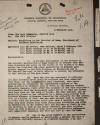
|
1.
6 February 1931.
Conditions in the District of Rama,
Department of Southern Bluefields.
Col. John
Marston, Bluefields, to Jefe
Director GN, Managua, p. 1.
Re Planters
Association of Rama.
|
|
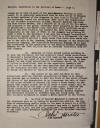
|
2.
6 February 1931.
Conditions in the District of Rama,
Department of Southern Bluefields.
Col. John
Marston, Bluefields, to Jefe
Director GN, Managua, p. 2.
Re Planters
Association of Rama.
|
|
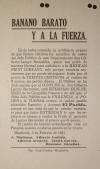
|
3.
6 February 1931.
Conditions in the District of Rama,
Department of Southern Bluefields.
Col. John
Marston, Bluefields, to Jefe
Director GN, Managua, p. 2.
Re
Planters Association of Rama:
Enclosed flier: "BANANO BARATO Y A
LA FUERZA. Contra el Jefe Político
Gilberto Lacayo Bermúdez, selling out to
the Mexican Fruit Company, forcing
planters to sell for 30 cents a stem,
using Violence, Power & Force against
the poor planters of Rama. In
Panama bananas are worth 60 cents.
Bluefields. /s/ A. Mallona,
Alberto Guillén, Alberto Alvarez, Jesús
García, Dámaso Sánchez. Tip. Cines
Caribe, Bluefields."
|
|
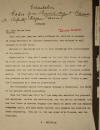
|
6 February
1931 (n.d.).
Radiogram from F.
Espinoza, Fiscal Agent Rama, to
National Assembly Deputy Mr. Juan Cajina
Mora, Managua.
"Translation:
¶ Four soulless jews had badly
informed Mr. Mallona on account of being
President of Planters Association, who
refuses to sell bananas at thirty cents.
¶ Mallona is imprisoned and he is
only complying with instructions of the
Association. ¶ Emphatically
I deny and I swear to the Lord that
there is nothing as a bad intention
among the planters against any person.
They are surprised at the good faith of
the Government. It’s seen with
repugnance that the Guardia Nacional
meddles in their business without
motive. In Bluefields it’s badly
ignored the harm done by obligating the
planters to sell their bananas at thirty
cents. Within a year the
Nicaraguans will have no plantations.
¶ The Government should
investigate through a commissions, the
facts of the actions before proceeding.
¶ When the “American Fruit Co.”
ran away, who swindled the planters and
employees, neither the authorities, nor
the public protested. But now that
there is another company that wants to
carry of the bananas, everybody yells,
and makes false reports just because the
Planters defend themselves.
Publish it. You can speak with
friends, and the President."
|
|
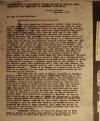
|
7 February
1931.
Excerpts from a Confidential Letter from
Capt. H. N.
Stent, Puerto Cabezas, to Col.
John Marston, Bluefields, p. 1.
"Puerto Cabezas,
7 February 1931 ¶ My dear Colonel
Marston:-- ¶ The most startling
information which I have received is
that there are disloyal guardia here and
that some of them made a statement at
Logtown, prior to the departure of
Darrah’s patrol to Sacklin, that they
would not fight bandits but would join
them if they could. This ties in with
one or two other statements made by
guardia during the past six months. The
Logtown business was reported to me the
night Captain Wood left (for
Bluefields). These reports have been, to
a certain extent, vague and I’m having
considerable trouble tracing them, but
will eventually. The search has narrowed
down to a few guardia, and as usual, the
reason for this discontent must be
found. I believe someone has been
working on the guardia from the outside.
Inasmuch as they are Conservatives (the
guardia) for the most part who are
suspected, I lay the cause probably
somewhere in the neighborhood of Gallo
or Arana or perhaps others I don’t know.
(Gallo is the lawyer about whom the Area
Commander, Eastern Area,, has already
submitted a report.) There is a strong
Conservative element here and although
the Conservative candidate Arana
professes his loyalty, I neither trust
him or his family. I am not worried
about this situation but I have two very
severe lessons with disloyal guardia
before, and I don’t believe in taking
chances.*****. There is no danger of a
mutiny but we will have to be watchful
in the case of future patrols until we
locate the guilty parties. ¶ Now there
is the case of Adolfo Cockburn of
Sacklin. Wood no doubt told you of
Darrah’s experience with him as regards
his expressed sympathy with Sandino My
informants told me night before last
that this is positively true; that he,
Cockburn, controls the Indians in his
vicinity; that he is a very close friend
of Abram Riviera and that when the
bandits last came to Sacklin they
greeted him (Cockburn) with open arms.
His goods were the only ones not
molested and he went armed with the
group on the friendliest terms.
Furthermore, he came to Logtown a couple
of days ago on the pretense of wanting
work, was denied and returned to
Sacklin. On top of that a white man by
the name of GREEN who possessed a
pistol, stole two shotguns and another
pistol, a couple of mules and with a
native woman, started for the river,
openly stating he was going to join up
with the bandits. By prompt action, we
captured him after a short pursuit, with
arms and mules to boot. He is now being
held as a bandit prisoner and your
instructions are awaited. ¶ COCKBURN,
however, is still at large and we have
made no effort to capture him because I
am certain as soon as we had him we
would have Gallo on our hands again.
[...]"
|
|

|
7 February
1931.
Excerpts from a Confidential Letter from
Capt. H. N.
Stent, Puerto Cabezas, to Col.
John Marston, Bluefields, p. 2. "[...]
We would then have to release him and
this would hurt us greatly. He has no
intimation that we suspect him, I don’t
believe. During the past month two very
suspicious characters came to Logtown
under the pretense of looking for work,
and then disappeared. Both came over
from Sacklin and both were foreigners;
one an Austrian or German and the other
of uncertain nationality, probably
European. Information points to a strong
group, well armed, in the Patuca River
district with an outpost near Tilba
Falls where they can see up and down the
river for long distances. Indians also
say there are more between Bocay and
Santa Cruz on the Coco (Wanks). The
Patuca River outfit is composed of all
nationalities and are, of course, out of
reach on Honduranian territory . I
believe that arms are being smuggled to
the Segovias and Jinotega thru there.
Any attempt on them from this end would
be doomed to failure but I have strong
hopes of being able to intercept the
next group that comes down the river.
With this in view, I have sent out a
couple of Indians from Logtown who are
out of work and have promised them a
reward for timely information. Also the
Indians are stirred up over the killing
of two Indians by the last group of
bandits and the theft of many of their
shotguns. ¶ What do you recommend that
we do in the case of COCKBURN? I’ve
tried to make the case clear. He is in
league with the bandits but I doubt if
we can make a civil court see it an what
would be done with him if we did?
Respectfully yours, H. N. Stent."
|
|
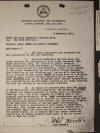
|
9 February
1931.
Report on Henry GREEN and Adolfo
COCKBURN, Col.
John Marston, Area Commander,
Eastern Area, to Jefe Director GN,
Managua.
"9 February 1931
¶ Subject: Henry GREEN and Adolfo
COCKBURN. ¶ Enclosures 3. ¶ 1. The three
enclosures are forwarded for the
information of the Jefe Director. ¶ 2.
The Area Commander, Eastern Area, has
never received any instructions which
cover instances like those described.
When, for reasons of public security, I
have attempted to hold individuals as
“military prisoners” or have arrested
men for investigation, either civil
lawyers or the courts themselves, by
intervention through Managua, have
placed me on the defensive and I am now
at a loss as to how to proceed in such
cases. GREEN is being held as a military
prisoner until I have received
instructions in regard to his case.
COCKBURN will not be disturbed until
further instructions are received unless
he definitely commits an act which
involves him with the outlaws of the
Coco River district. ¶ 3. It should be
remarked here that the courts of the
East Coast, with few exceptions are
perfectly willing to permit the Guardia
Nacional to handle cases of outlawry,
banditry, etc., but civil lawyers, by
falling back on the criminal code,
persistently offer legal obstructions
and not infrequently, by appealing to
senators or deputies, bring into play
enough governmental interference that
practically results in the immediate
release of the men under investigation.
There have been no convictions by jury
trial in Bluefields since May, 1929,
except one case of a guardia turned over
to the Criminal Court for trial during
my leave of absence in the United
States. It is obvious that the courts
cannot be relied upon to handle properly
such cases as may be turned over to them
for trial. ¶ (signed) JOHN MARSTON"
|
|
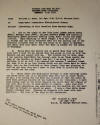
|
11 February
1931.
Deserting of Four Guardias from Neptune
Mine, 1st Sgt.
Wilfred A. Dash, Neptune Mine, to
Dept. Commanders, Bluefields & Puerto
Cabezas.
|
|
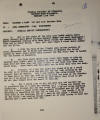
|
11 February
1931.
Special Report (Deserting).
1st Sgt. Wilfred
A. Dash, Neptune Mine, to Col.
John Marston, Bluefields, p. 1.
(Evidently a
follow-up report after the first, above,
was found to be inadequate.)
|
|
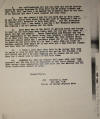
|
11 February
1931.
Special Report (Deserting).
1st Sgt. Wilfred
A. Dash, Neptune Mine, to Col.
John Marston, Bluefields, p. 2.
|
|
|
|
|
PREVIOUS
NEXT
|
|
|
|
|
|
|
|
